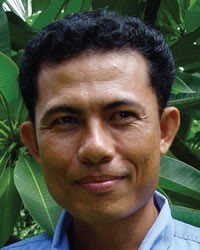The Lao belong to the Tai linguistic group, which began migrating southward from China in the first millennium after Christ, and which now politically and culturally dominate other Laotian groups.
Many Laotians came to America as refugees after the Vietnam War. Others left Laos after it became a communist country in 1975. Most American people are unaware that tens of thousands of Laotians died as a result of US bombing of the Ho Chi Minh Trail that ran through Laos. Some Laotians have come to the USA in recent decades seeking freedom and a better life for their children.
Many Laotian Americans live in southern California. Others live in the San Francisco Bay Area, in Fort Worth, TX and in the Sacramento and Seattle regions.
Even after being in the USA for decades, many Laotian Americans live below the poverty level. Most first generation Lao work menial jobs years after coming to the USA. Many leave high school before graduating to help support their families. However, most Lao parents want their children to get a good education so they can make more money than they did. Laotian extended families depend on one another, and there is a very low divorce rate for Laotian marriages.
Older adults do not learn more than just the rudiments of English. An online magazine, LaoAmericans.com, gives stories of Laotian Americans who have succeeded in their new land. Some of them have achieved renown in the sport of badminton.
Laotian Americans speak Lao at home and English on the job or at school. Some second and third generation Lao speak English at home and with their family.
Lao cuisine is noted for being spicy, but it has not caught on like Thai food. They eat a lot of fish, rice and vegetables.
Most Laotians continue in their Buddhist and animistic beliefs. They attend Buddhist temples on a regular basis. Some Laotians have become secular and no long participate in Buddhist rituals, but still celebrate Buddhist holidays as part of their cultural heritage. Buddhism allows people to mix Buddhist teachings with folk religion.
Two of the important Buddhist yearly holidays are Vesak, the Buddha's birthday celebrated in May or June and Bodhi Day, the holiday in December or January which commemorates the day that the historical Buddha experienced enlightenment under a Bodhi tree.
Laotian Americans need to see the love of Christ demonstrated to them in practical ways. Many would benefit by becoming more proficient in English and in gaining new job skills. Most of all, they must understand their personal sin and their need for the savior. Christ alone can forgive their sins and grant them eternal life.
Pray that Laotian Americans develop a spiritual hunger for the things of the true God of the Bible. Pray that believers will reach out and share the good news with the American Laotians. Pray that the Lao will be moved of God to read the Bible in their heart language. Pray the Lord raises up a church planting movement among the Lao in the US.
Scripture Prayers for the Lao in United States.
https://en.wikipedia.org/wiki/Laotian_Americans
https://www.everyculture.com/multi/Ha-La/Laotian-Americans.html
https://www.asian-nation.org/laotian.shtml
https://www.latimes.com/california/story/2019-08-25/southeast-asia-histories-ethnic-studies-curriculum
https://www.lanausa.org/
| Profile Source: Joshua Project |











